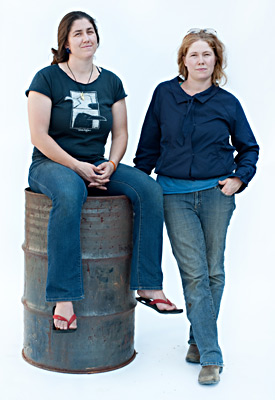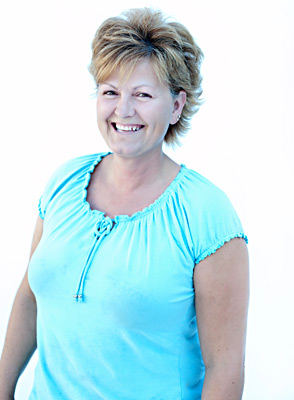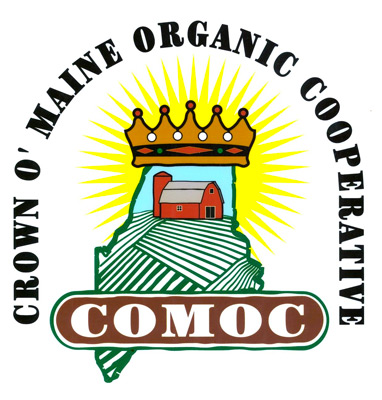 |
| Leah and Marada Cook of Crown O’ Maine Organic Cooperative. Lily Piel photo, courtesy of COMOC. |
By Betsy Garrold
Hard work and quality are recurring themes when you talk to the crew at Crown O’ Maine Organic Cooperative (COMOC, https://crownofmainecoop.com/). Since the early days, when Jim and Kate Cook delivered local, quality potatoes in their family van, to the present, when daughters Leah and Marada Cook run the business, COMOC has emphasized doing things right – while keeping the company at a human scale.
Leah quotes Edward Abbey: “Growth for the sake of growth is the ideology of the cancer cell.” And Marada said at a recent Slow Money Maine gathering about Northern Girl (another enterprise of these two energetic young women), “Northern Girl will not recreate a bad model. We are not looking to transplant the Jolly Green Giant to Maine.”
Marada quoted her father in a 2007 article in The MOF&G: “We have never been the classic ‘middlemen.’ We don’t follow commodity pricing. We don’t speculate on farmers’ produce. We ask, ‘How much do you need at the farm gate to make this work for you?’ In order to pay farms fairly, you must recognize that a ‘good deal’ is not just about price. It is about quality.”
That mindset of fairness and doing the right thing is reflected in the current move to formalize COMOC as a worker-owned cooperative. When Jim and Kate started the business from their potato farm, Skylandia, they and Wood Prairie Farm had hoped to create a producer cooperative in the tradition of Cabot or Ocean Spray. After hitting many snags and delays, the idea evolved into the Cooks’ distribution company for, at first, potato farmers in The County.
Marada and Leah remember their father as a consummate salesman who sold the idea of a distribution system to farmers in order to get their goods to the Portland and Boston markets. The company was based on quality. Maine had lost its reputation for producing quality potatoes, and Jim set out to demonstrate to high-end chefs and produce buyers in those two metropolitan areas that Maine produce was fresher and equal to or better than anything they could buy from farther away.
COMOC concentrated on root and storage crops the first few years, but word spread in the farm community about the service the Cooks were very good at providing. In the early 2000s, COMOC added a midcoast route and started acting as a broker for potatoes. This soon turned into a monthly statewide distribution route. In 2004 they started talking about becoming a true distribution company, and in 2006 Jim said to Leah, “Hey, kid, what do you think about getting your commercial driver’s license (CDL)?”
 |
 |
 |
| Along with the Cook sisters, Katrina Berry, Maria Reynolds and Louise Booth (top to bottom) are part of the worker-owned Crown O’ Maine Organic Cooperative. Lily Piel photos, courtesy of COMOC. |
Around this time COMOC started distributing Aurora Mills grain products while continuing to deliver 20 varieties of potatoes and root crops, with Leah driving the truck.
Both Marada and Leah now agree that the business was built on “sweat and a song.” And it may not necessarily have succeeded at any other time in history or in their lives. The happenstance that built the business was possible because they had a crew of 20-somethings willing, in 2006, to work 16-hour days to strip out an old warehouse and salvage coolers, compressors and freezers. This boost to their business at a crucial time was one of many daring feats that built the company.
In 2006 Leah left temporarily to join the Peace Corps and Marada stepped into the business. In 2008, just before Jim’s untimely death, he and Leah put in place (with the prodding of family friend Jane Livingston) the basic structure and bylaws of a worker-owned cooperative. Based on reading The Company We Keep: Reinventing Small Business for People, Community, and Place by John Abrams, they moved past Jim’s feeling that “we’re already a cooperative; we collaborate to not ruin each other’s markets.” They formalized the structure of the family-owned business, which was already essentially being run as a worker-owned cooperative, into an actual worker-owned business.
Through many changes, added personnel and the evolution of a growing business (including three warehouse moves), the question of the structure of the business continued to pop up. In February 2014, the Cook sisters and three of their longtime employees met to review the final steps of making COMOC a worker-owned and operated co-op.
The three employees who, along with the Cook sisters, will form the core of the co-op are Maria Reynolds, Louise Booth and Katrina Berry. From vastly different backgrounds and having come into the COMOC “family” via markedly different routes, this group of women complement and support each other with their unique strengths.
Booth’s “bucket list” included learning to drive a truck, so she went to Women Unlimited (https://womenunlimited.org), got her CDL, and Jim Cook recruited her six years ago to drive two days every other week – allowing her to keep her other job as a self-employed hairdresser. Later she became fulltime at COMOC, first as a driver while the routes expanded, and now in the office as the route coordinator and dispatcher. She does not miss being on the road from 4 a.m. to 8 p.m., picking up produce from farmers and dropping orders at stores and food co-ops, first on the Belfast-Blue Hill route and then farther down the coast to Rockland, Damariscotta and Freeport. She jokes that she has tried to quit or get fired many times but always gets talked out of it. The jesting around the table about hanging onto Booth’s ankles as she tries to go out the door reflects the easy camaraderie among this small band of women doing hard work.
Berry came to COMOC straight from high school, having decided not to go $60,000 in debt for a college education when she did not know what she wanted to study. She came to the first meeting about forming a worker-owned co-op with a five-page hand-written letter stating her ideas and concerns about the proposal. This meeting was at Booth’s house after the rainy summer of 2009, the season Marada calls “the summer of no produce.” There was a palpable sense of, “Phew, we made it through, now what?” The consensus was that the cooperative was a good idea, but they weren’t quite ready for it. One goal to be met to make the idea viable was to reduce everyone’s hours to a reasonable workweek. Berry, with COMOC for five years now, manages personnel and the warehouse and is a trained food safety professional. She does everything from squeegeeing water off the tops of coolers during ice and rainstorms to organizing pallets that leave the warehouse.
Reynolds, who runs her own MOFGA certified organic seed farm business, Groundswell Seed Farm (https://groundswellfarm.wordpress.com), came to COMOC from Johnny’s Selected Seeds in 2011 to help with sales growth, outreach and development. Marada praises her ability to find ways to make their systems more efficient. Reynolds says of the conversion to a worker-owned co-op, “The dedication that Marada and Leah have shown this business is reflected in the dedication of their employees. It is a great thing that they are willing to recognize those efforts by offering employees the chance to be worker-owners.”
In a recent blog post Leah said, “People around the country are trying to figure out how to make local foods distribution models work, and while we work our butts off, one of the ways we can make it happen is by doing the routing dance with the help of our producers and customers. The ability to adapt our schedules and routes has helped us to grow this business from our parents, in the family van, to the growing professionality we aspire to.” Or as she said in a recent interview, “Think about what you have and the possibilities it can create.”
As COMOC moves into its next iteration, it truly lives up to its own catch phrase: “Making it happen in Maine.”
About the author: Betsy Garrold farms and writes at The Shire in Knox, Maine. You can read her blog about the politics of agriculture at thepopulistfarmer.wordpress.com.
COMOC’s Buying Club Business Increasing
 |
In addition to delivering to food coops, natural foods stores, farm stores, restaurants and other retail outlets, COMOC delivers quality foods to 55 buying clubs in Maine. Buying clubs range in size from a few friends, neighbors or co-workers who split a few cases of food in a member’s kitchen, to hundred-member groups who buy case lots, have them delivered to a Grange hall or other location and divide the food there. Buying clubs offer a way to eat good food at lower cost. See https://crownofmainecoop.com/clubs.asp for more information.
